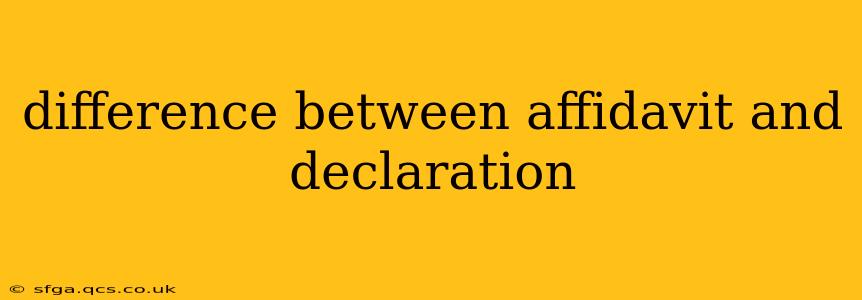Affidavits and declarations are both sworn statements, but they differ significantly in their legal weight and the procedures surrounding their creation and use. Understanding these differences is crucial, especially for those navigating legal or official processes. This comprehensive guide will clarify the key distinctions between affidavits and declarations, answering common questions along the way.
What is an Affidavit?
An affidavit is a sworn written statement made under oath before a person authorized to administer oaths, such as a notary public or commissioner of oaths. This oath adds a significant layer of legal consequence; perjury, the act of lying under oath, carries serious legal penalties. The affiant (the person making the affidavit) signs the document, affirming the truthfulness of its contents. The authorized official then signs and stamps the affidavit, attesting to the affiant's oath.
What is a Declaration?
A declaration, while similar to an affidavit in that it's a written statement, is not sworn under oath. It's a formal statement of fact, but the signer simply affirms the truthfulness of the information to the best of their knowledge. While it carries less legal weight than an affidavit, it's still considered a serious document and making false statements can still have consequences, potentially facing charges of making a false declaration. The specific consequences vary by jurisdiction and the context in which the declaration is used.
Key Differences Between Affidavits and Declarations: A Side-by-Side Comparison
| Feature | Affidavit | Declaration |
|---|---|---|
| Oath | Sworn under oath before an authorized official | Not sworn under oath |
| Legal Weight | Higher; carries more legal weight | Lower; less legally binding |
| Penalties for False Statements | Perjury charges (serious legal consequences) | Penalties vary by jurisdiction and context |
| Witness | Requires the presence of a witness (notary, commissioner, etc.) | Typically doesn't require a witness |
| Formalities | More formal; specific formatting requirements may apply | Less formal; formatting requirements are less stringent |
What are the typical uses of each?
Affidavits are commonly used in legal proceedings, such as:
- Supporting court documents: Providing evidence in lawsuits, custody battles, or other legal disputes.
- Property transfers: Verifying ownership or other details related to real estate transactions.
- Immigration applications: Providing evidence to support immigration petitions.
- Criminal investigations: Providing statements to law enforcement.
Declarations, being less formal, often find use in:
- Administrative proceedings: Providing information to government agencies.
- Business transactions: Affirming specific facts in business dealings.
- Supporting certain non-legal documents: Such as applications or attestations where a formal sworn statement isn't strictly required.
Is an affidavit always necessary?
No, an affidavit is not always necessary. The required form of statement—affidavit or declaration—depends entirely on the specific legal or administrative requirements of the situation. Some situations may accept either, while others explicitly require an affidavit due to the higher level of accountability and evidentiary weight it carries. Always check the specific instructions provided by the relevant authority or organization.
What happens if I lie in an affidavit or declaration?
Lying in an affidavit constitutes perjury, which is a serious crime, often punishable by fines or imprisonment. Lying in a declaration can also lead to serious consequences, though the specific penalties vary depending on the jurisdiction and the context in which the false statement is made. These consequences may include legal action, fines, or even criminal charges. It’s always crucial to ensure the accuracy and truthfulness of any sworn statement or declaration you submit.
By understanding the crucial differences between affidavits and declarations, you can navigate legal and official processes with greater confidence and ensure you comply with all relevant requirements. Remember to always consult with legal counsel if you have questions regarding the appropriate documentation for your specific situation.
